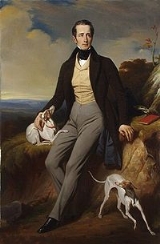
.
Lamartine was born in Mâcon
, Burgundy on 21 October 1790. His family was part of the French provincial nobility, and he spent his youth at the family estate. Lamartine is famous for his partly autobiographical
poem, "Le Lac" ("The Lake"), which describes in retrospect the fervent love shared by a couple from the point of view of the bereaved man.
I say to this night: "Pass more slowly"; and the dawn will come to dispel the night.![]()
Let us love the passing hour, let us hurry up and enjoy our time.![]()
Love alone was left, as a great image of a dream that was erased.![]()
Limited in his nature, infinite in his desires, man is a fallen god who remembers the heavens.![]()
What is our life but a succession of preludes to that unknown song whose first solemn note is sounded by death?![]()
Experience is the only prophesy of wise men.![]()
To love for the sake of being loved is human, but to love for the sake of loving is angelic.![]()
The more I see of the representatives of the people, the more I admire my dogs.![]()
Sometimes, only one person is missing, and the whole world seems depopulated.![]()

